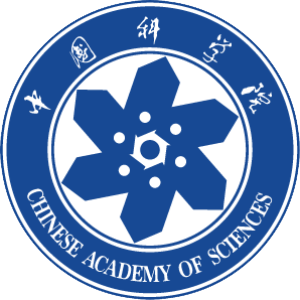-
 Professor Geng Yanhou's Theme Lecture on "Conjugated Polymer Synthesis Methods"
Professor Geng Yanhou's Theme Lecture on "Conjugated Polymer Synthesis Methods"At 15:30 on October 11, 2023, Geng Yanhou, a professor of the School of Materials of Tianjin University, invited by Professor Huang Hui, came to the University of the Chinese Academy of Sciences to give a lecture on the theme of "conjugated polymer synthesis methods", which was held in Classroom 306 on the first floor of the classroom.

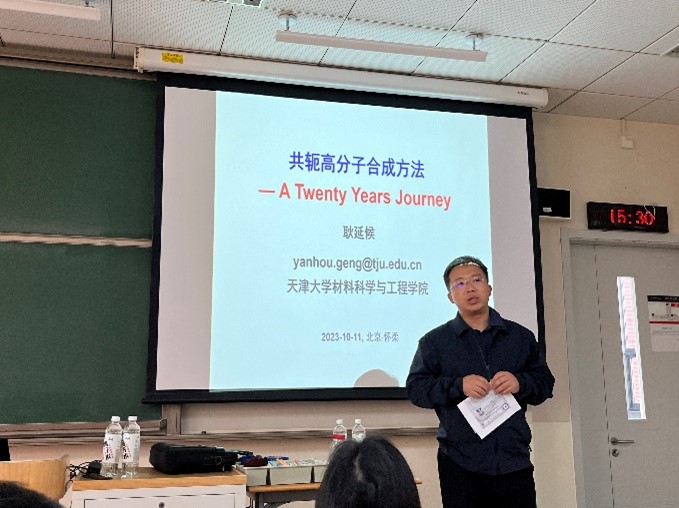
The research on synthesis methods is the core of chemical research, which can provide a material foundation for a deep understanding of the basic properties of co polymers and the establishment of structure-activity relationships. It is also the foundation for the development of high-performance materials with independent intellectual property rights.
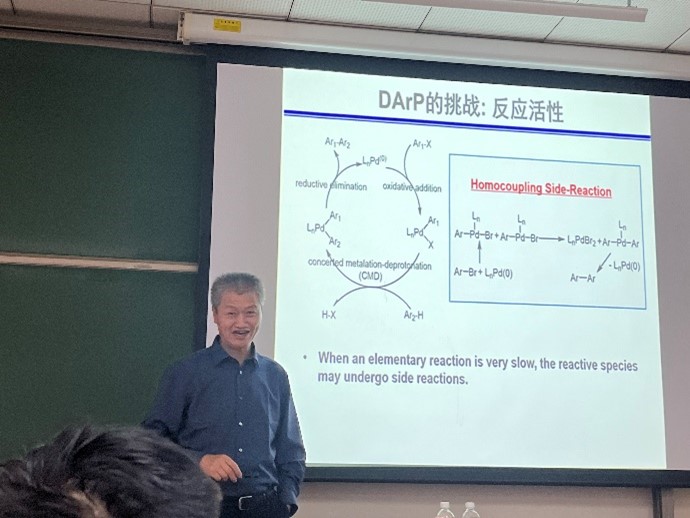
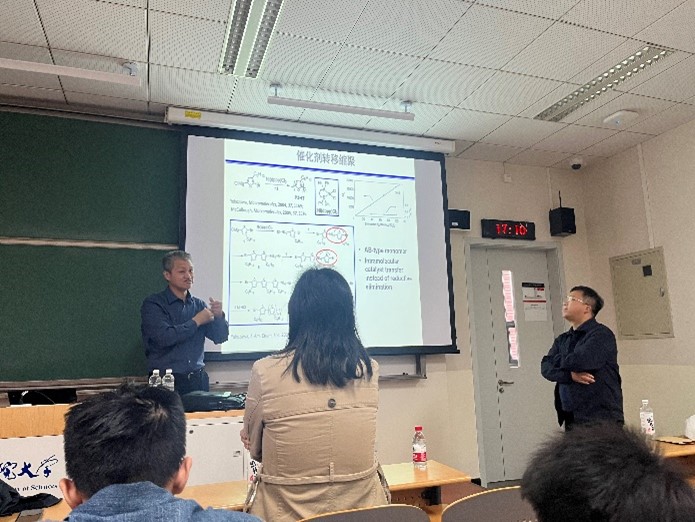
Professor Geng Yanhou systematically introduced his research achievements from three aspects: the synthesis strategy of monodisperse conjugated polymers, the controllable synthesis of conjugated polymers, and the direct arylation polycondensation synthesis of polymer semiconductor materials. Firstly, various synthesis strategies for monodisperse conjugated polymers were introduced, and conjugated polymers with an absolute molecular weight exceeding 20000 g/mol were synthesized. The extended chain crystallization characteristics of conjugated polymers were demonstrated, and nanostructured photovoltaic effect films with near ideal heterojunctions were constructed. Subsequently, catalytic transfer polycondensation reactions of various AB monomers were studied, achieving controllable synthesis of conjugated polymers such as polyfluorene. It was found that intramolecular transfer of the catalyst can occur on non conjugated main chains. Finally, a series of high mobility n-type and bipolar polymer semiconductor materials were developed by developing highly active C-H monomers of polyhalogenated thiophene derivatives, combining polymerization method research with high mobility material design. Finally, Professor Geng Yanhou had exchanges and discussions with the on-site teachers and students, and received a warm response from the on-site teachers and students.
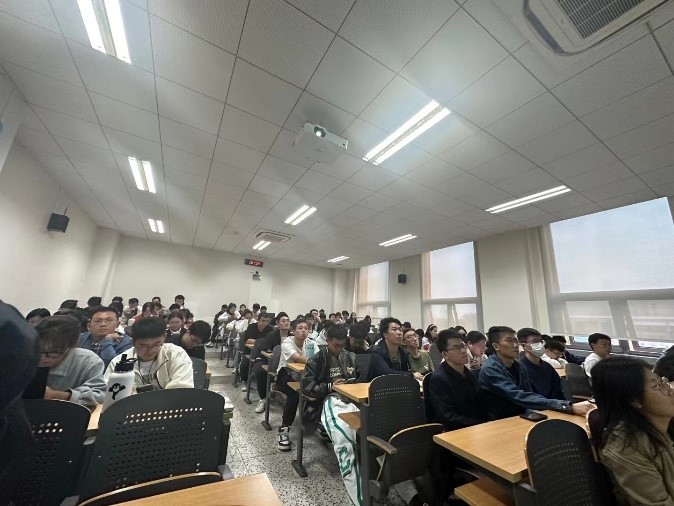
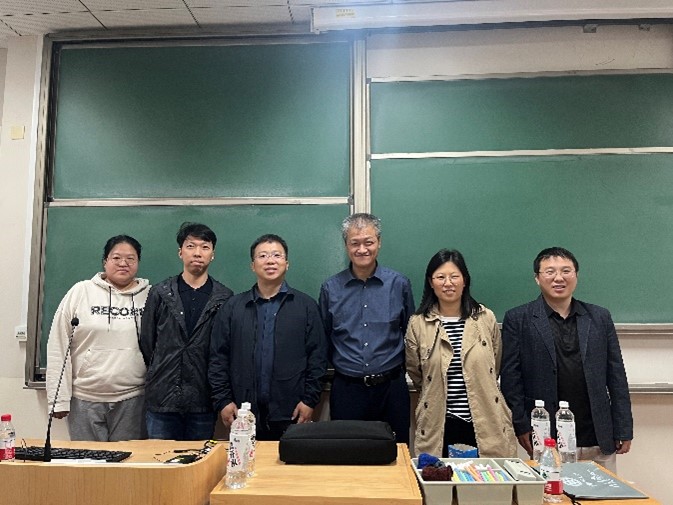
Geng Yanhou, winner of the "Hundred Talents Program" of the Chinese Academy of Sciences (2003), the "National Fund for Distinguished Young Scholars" (2005) and the special government allowance of the State Council (2011), was selected into the second batch of "Ten Thousand Talents Program" of the Organization Department of the CPC Central Committee in 2016. Graduated from the Department of Applied Chemistry at Shanghai Jiao Tong University in 1991, and obtained a doctoral degree from the Changchun Institute of Chemistry, Chinese Academy of Sciences in 1996. From 1998 to 2003, he conducted visiting research at the Hong Kong University of Science and Technology, the Max Planck Polymer Research Institute in Germany (recipient of the Humboldt Scholarship), and the University of Rochester in the United States. From 2003 to 2015, he served as a researcher of Changchun Institute of Applied Chemistry, Chinese Academy of Sciences, and currently he is a professor and doctoral supervisor of School of Materials, Tianjin University. Published over 250 academic papers, applied for and authorized more than 20 invention patents, and won one second prize in National Natural Science Award and one first prize in Jilin Province Science and Technology Progress Award. Research interests include: (1) organic/polymer semiconductor materials and their applications; (2) Novel aromatic polycyclic compounds and their copolymers; (3) The synthesis method of copolymers.
-
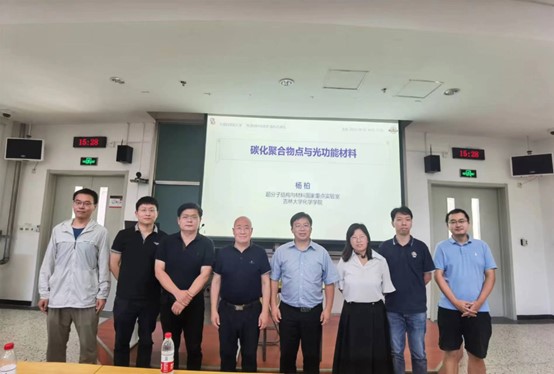 Professor Yang Bai "Carbonized polymer points and optical functional materials" keynote lecture
Professor Yang Bai "Carbonized polymer points and optical functional materials" keynote lectureAt 14:00 on September 13, 2023, Professor Yang Bai from Jilin University, at the invitation of Professor Huang Hui, came to the University of Chinese Academy of Sciences to give a lecture on the theme of "Carbonized polymer points and Optical functional Materials". The lecture was held in Room 106 on the second floor of the classroom.

Professor Yang Bai first introduced the development history of nano-hybrid and high-performance optical materials, and then led to high-performance carbonized polymer point optical functional materials. Carbonized polymer points are a new type of carbon points with polymer characteristics and core-shell structure, which have the advantages of low toxicity and easy preparation as nanoelements. Carbonized polymer dots were prepared by physical methods in the early stage and developed to chemical methods in the later stage. The fluorescence quantum yield of carbonized polymer dots prepared by chemical methods in 2013 by Professor Yang Bai's research group reached 80%. Then Professor Yang Bai introduced the synthesis method of carbonized polymer points in detail, proposed the cross-linking enhanced emission effect and its universality, and proposed the core-shell structure and naming of carbonized polymer points. Then Professor Yang introduced the application of carbonized polymer dots in fluorescence, phosphorescence, tumor treatment, antibacterial and other aspects. At last, Professor Yang Bai exchanged and discussed with the on-site teachers and students, and got a warm response from the on-site teachers and students.
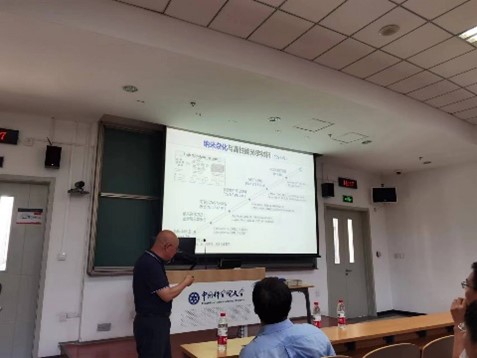
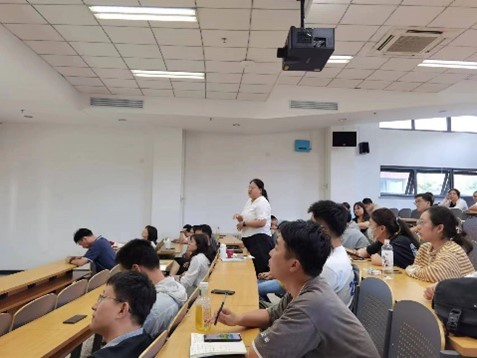
Yang Bai, graduated from the Department of Chemistry of Jilin University in 1984, got his Ph. D. degree in 1991, has been teaching at Jilin University since 1987, and has been a professor since 1994. In 1999, he was appointed as a Changjiang Scholar by the National Outstanding Young People Fund, and in 2009, he was supported by the National Innovative Research Group Fund. He served as the dean of the School of Chemistry and the director of the State Key Laboratory of Supramolecular Structure and Materials. His research interests include polymer nanohybrids, carbon point design and synthesis, and optical functional materials. He has published more than 700 SCI papers, which have been cited more than 49,000 times (H-104), and a single paper has been cited more than 3200 times. Since 2014, he has been selected as a highly cited Scholar of Elsevier China continuously. Since 2018, he has been selected as a global highly cited scholar in the cross field of Clarivate. As the first complete student, he won the first prize of Provincial Teaching Achievement of higher Education of Jilin Province in 2009, the first prize of Science and Technology Progress of Jilin Province twice in 2007 and 2021, and the second prize of National Natural Science Award in 2010. He is currently the chairman of the Carbon Point Functional Materials Branch of China Materials Research Society.
-
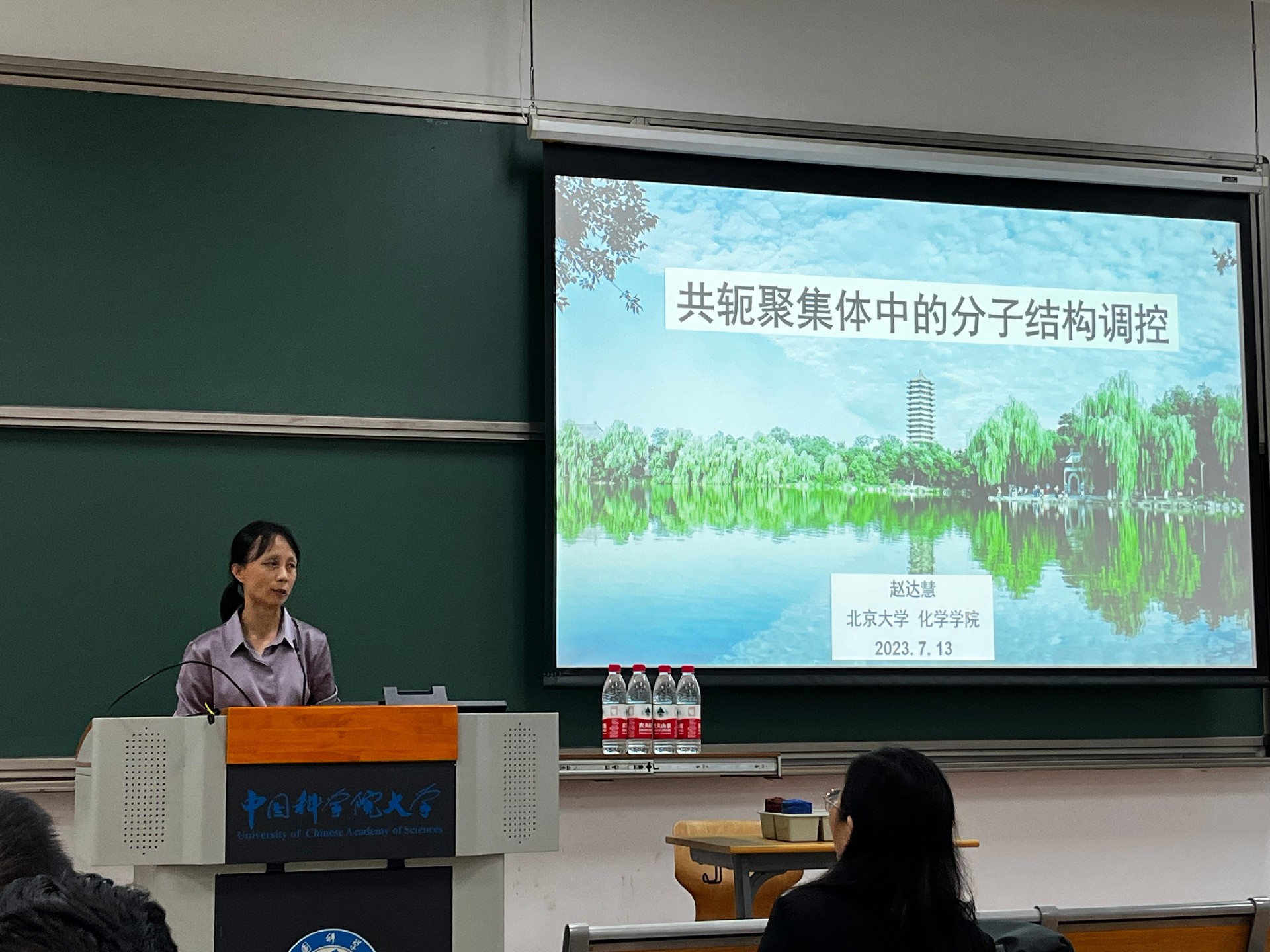 Zhao Dahui: Lecture on "Molecular Structure Regulation in Conjugated Molecular Aggregation"
Zhao Dahui: Lecture on "Molecular Structure Regulation in Conjugated Molecular Aggregation"At 14:00 on July 13, 2023, Zhao Dahui, a professor of the School of Chemistry, Peking University, was invited by Professor Huang Hui to come to the University of Chinese Academy of Sciences to give a lecture on "Molecular Structure Regulation in the Aggregation of Conjugated Molecules". The lecture was held at Room 125 on the second teaching floor.

Professor Zhao mainly explained the recent work of the research group. They found that the supramolecular aggregation structure of the organic co-major system has a significant impact on the optoelectronic properties of the material. The dominant force that determines the arrangement and aggregation of conjugated molecules is the van der Waals interaction characterized by pi-pi stacking. Compared with non-covalent interactions in the form of ionic bonds and hydrogen bonds, the directionality and strength of pi-pi stacking are weaker, resulting in complex and diverse molecular arrangements and changes in conjugated molecules, with low predictability. Therefore, the study of the aggregation structure of related systems and the regulation and prediction of the properties of materials have become a huge challenge.
The lecture mainly introduces some research progress made in the aspects of analyzing and revealing the complex aggregation behavior mechanism through rational design, systematically changing the molecular structure, and then tracking and regulating the change of photophysical properties of a series of fused-ring aromatic imines.
During the lecture, teachers and classmates actively interacted with Professor Zhao, and finally Professor Zhao's wonderful report received warm applause from the audience.
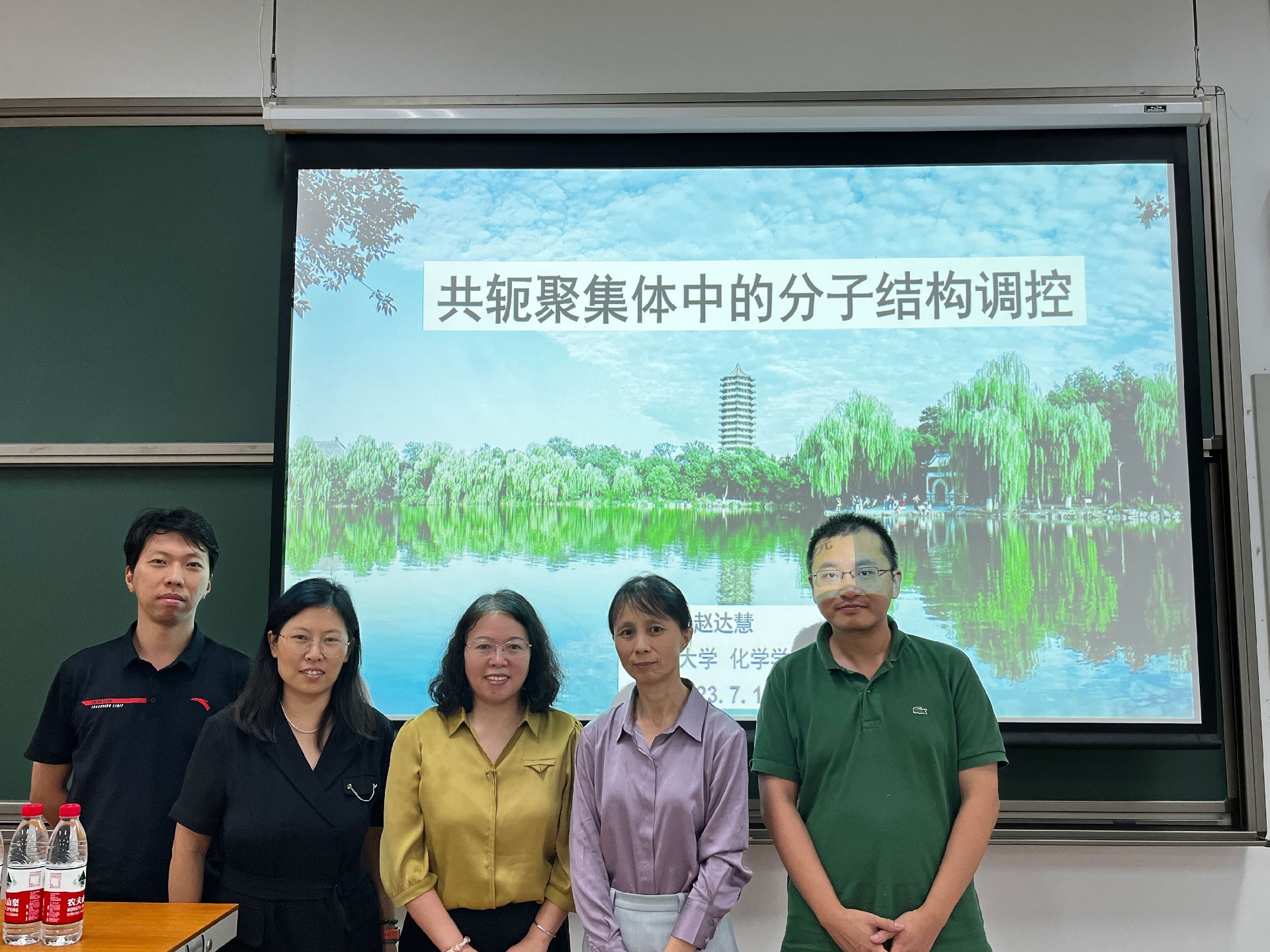
Zhao Dahui, Ph.D., professor, received a bachelor's degree from the School of Chemistry, Peking University in 1997, and a doctorate from the Department of Chemistry, University of Illinois, USA in 2003, and then conducted postdoctoral research at the Massachusetts Institute of Technology. Since 2006, she has been employed by the School of Chemistry, Peking University as the academic team leader and doctoral supervisor. The main research directions are the design and synthesis of new organic polymer optoelectronic functional materials, the controllable construction of supramolecular structures and property regulation. She has received honors such as the National Outstanding Youth Fund, the Excellent Youth Science Fund of the Fund Committee, the New Century Outstanding Talents of the Ministry of Education, the Fok Yingdong Foundation Young Teacher Fund, the Beijing Science and Technology Rising Star Program, and the Teaching Excellence Award of Peking University. She is currently the deputy editor-in-chief of Chemistry of Materials and Synfacts.
-
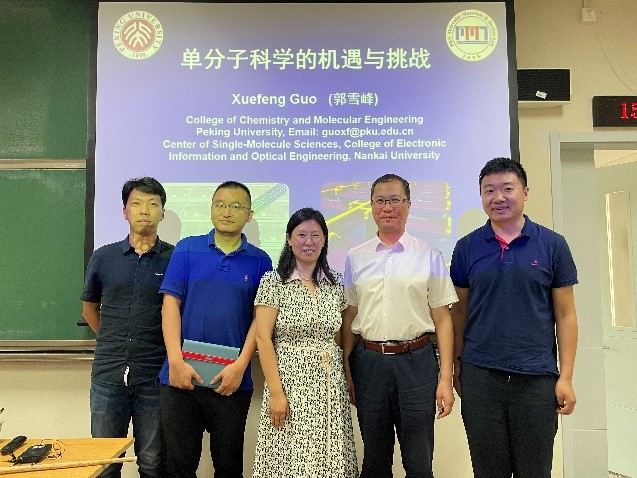 Professor Guo Xuefeng's lecture on "opportunities and challenges of single molecule Science"
Professor Guo Xuefeng's lecture on "opportunities and challenges of single molecule Science"At 14:00 on June 21, 2023, Professor Guo Xuefeng of Peking University gave a lecture on "opportunities and challenges of single molecule Science" at the University of the Chinese Academy of Sciences at the invitation of Professor Huang Hui.

Professor Guo Xuefeng first demonstrated his continued interest and great efforts in developing efficient lithography methods that can be used to create molecular electronic devices through the combination of top-down micro / nano processing and bottom-up molecular assembly. These devices use nano-coated carbon materials such as single-walled carbon nanotubes (SWCNTs) and graphene as point contacts and are formed by electron beam lithography and precision oxygen plasma etching. Through a strong amide bond, the functional molecules bridged with the diamine group are covalently connected to the carboxylic acid functionalized nano-Gap to form a stable carbon electrode-molecular connection with the desired function. Then, using these methods, we reveal the dependence of the charge transport of a single metal-DNA double strand on the stacking integrity, and fabricate molecular devices that can realize unlabeled, real-time electrical detection of chemical reactions or biological interactions at the level of a single event, or switch their molecular conductance when exposed to external stimuli such as electric field, magnetic field, ion, pH and light. Finally, Professor Guo Xuefeng communicated and discussed with the teachers and students at the scene, and received a warm response from the teachers and students at the scene.
Guo Xuefeng is a special professor at Peking University, winner of the National Outstanding Youth Fund and a leader in scientific and technological innovation in the Ten Thousand talents Plan of the Organization Department of the CPC Central Committee. He received his bachelor's and master's degrees from Beijing normal University in 2001, received his doctorate from the Institute of Chemistry of the Chinese Academy of Sciences in 2004, engaged in postdoctoral research at Columbia University from 2004 to 2007, and joined Peking University in 2008. Having been engaged in the research of molecular materials and devices for a long time, we have developed a breakthrough method for the preparation of stable single molecule devices, constructed the first stable and controllable single molecule electronic switching device in the world, and developed the core technology of single molecule electrical detection. it has opened up a new field of single molecule science and technology research.
-
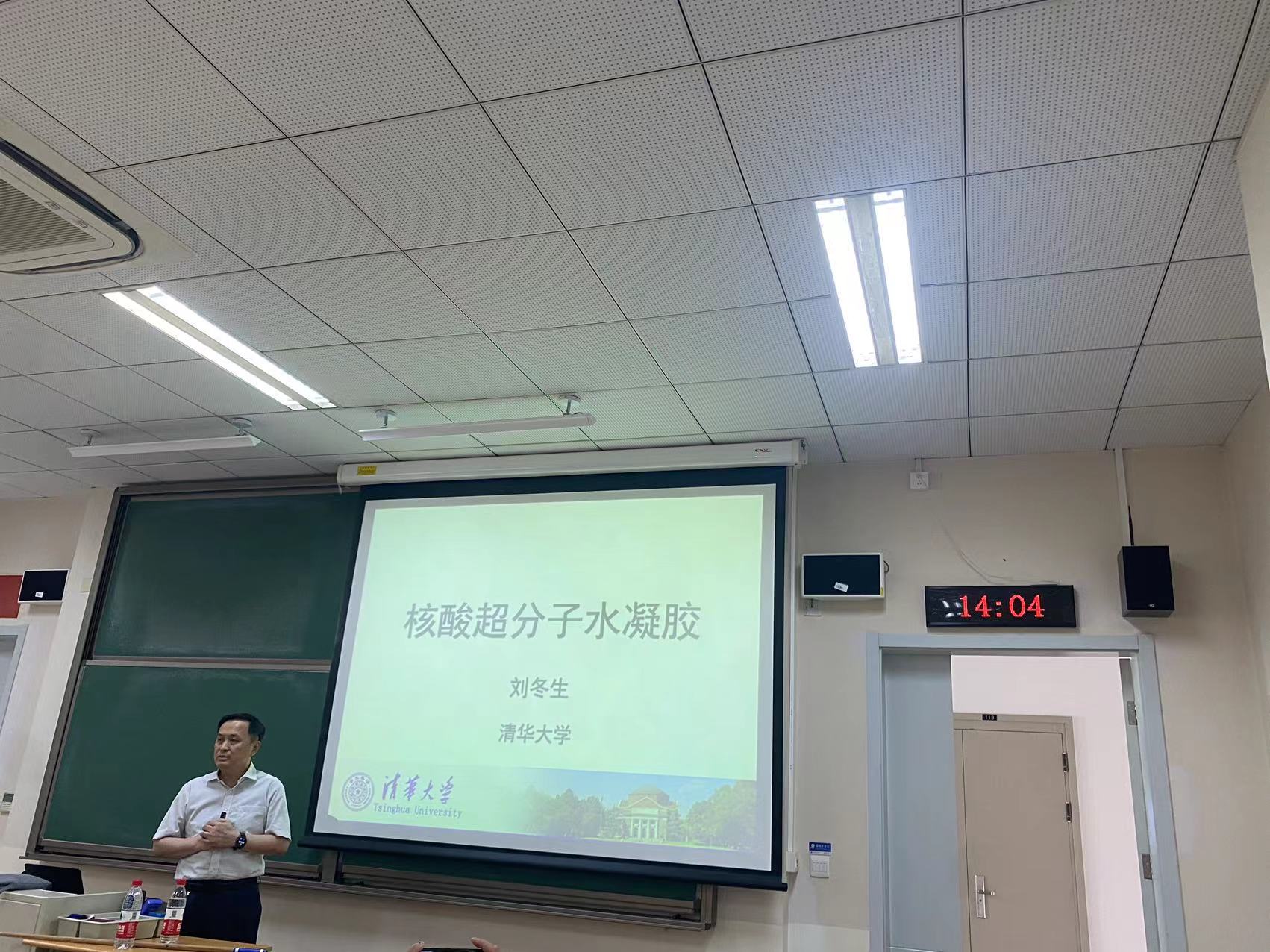 Professor Liu Dongsheng: Lecture on "Nucleic Acid Supramolecular Hydrogels"
Professor Liu Dongsheng: Lecture on "Nucleic Acid Supramolecular Hydrogels"At 14:00 on June 23, 2023, Professor Liu Dongsheng of Tsinghua University was invited by Professor Huang Hui to give a lecture on the theme of "Nucleic Acid Supramolecular Hydrogel" at the "Advanced Materials and Technology" Forum of the University of Chinese Academy of Sciences. Building 114 classroom held.

In his report, Professor Liu proposed a supramolecular hydrogel model with a fully rigid molecular structure, which can avoid the topological pores caused by the entropy curling of high molecular chains, and make it have ultra-high permeability similar to extracellular matrix.
Taking advantage of the high rigidity and water solubility of nucleic acid double-stranded molecules, a series of nucleic acid supramolecular hydrogels were constructed through sequence and structure design, and the high permeability of the fully rigid molecular network was proved by experiments and theoretical simulations. This kind of hydrogel also has the characteristics of high strength, fast gelation, injectability, self-healing and good biocompatibility. On this basis, its biomedical application has been explored, and research has proved that the gel can carry stem cells , Utilizing autologous signals secreted by the injured part of the organism to regulate the proliferation and differentiation of stem cells has achieved excellent results in the repair of total spinal cord injury. Using the designability of nucleic acid sequences, they also achieved univariate regulation of the mechanical properties of the hydrogel material based on the structure of the gel, and studied the influence of the mechanical properties of the material on the differentiation of stem cells. The results proved that the mechanical properties will not affect the sleeve Have a direct impact on the differentiation of stem cells. Finally, Professor Liu Dongsheng communicated and discussed with the teachers and students on site, and received enthusiastic responses from the teachers and students on site.
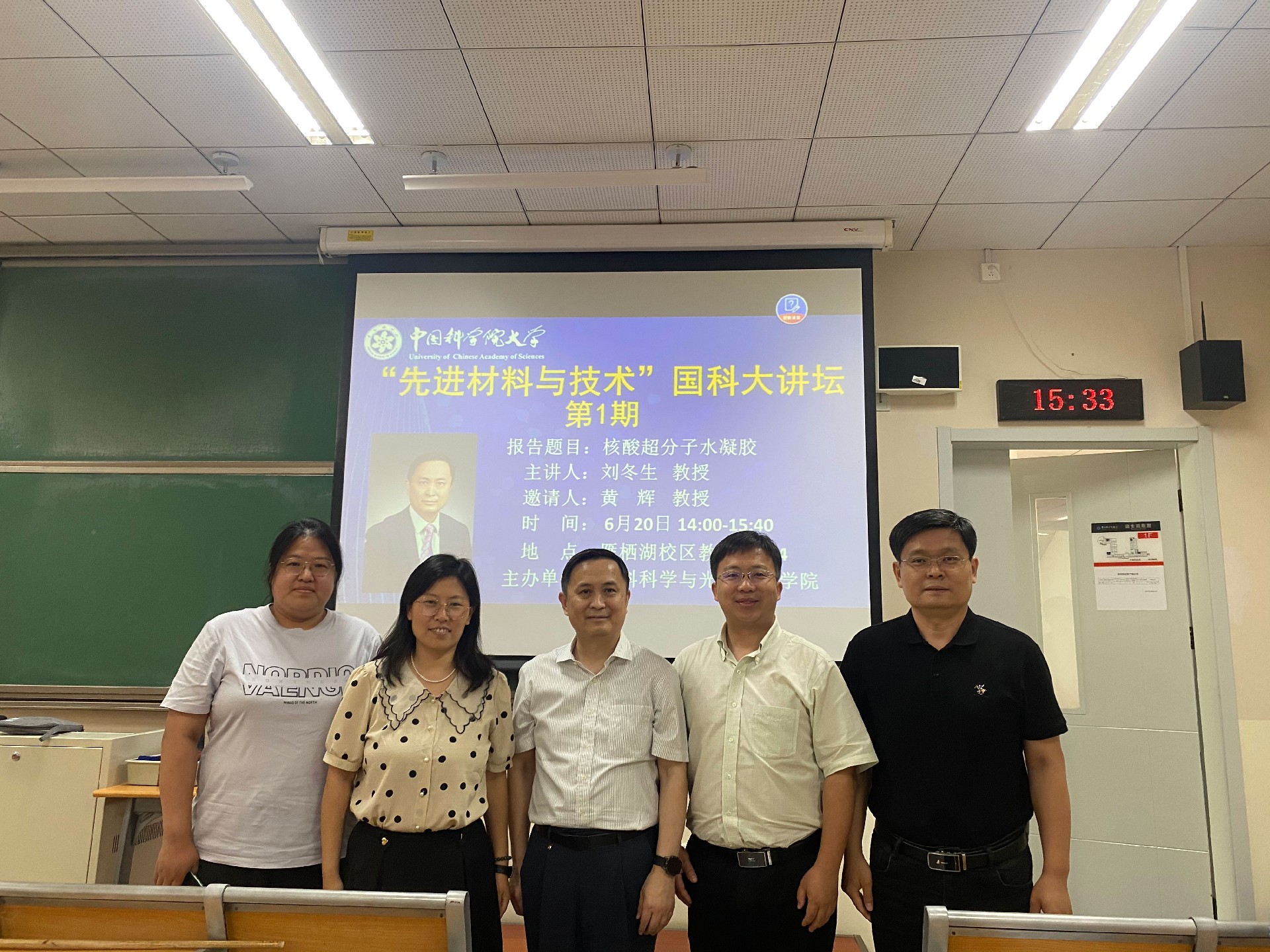
Introduction to the speaker: Liu Dongsheng, Distinguished Professor of Cheung Kong Scholars of the Ministry of Education, Department of Chemistry, Tsinghua University, doctoral supervisor. Fellow of the Chinese Chemical Society, Fellow of the Royal Society of Chemistry; Selected into the Young and Middle-aged Scientific and Technological Innovation Leading Talents Program of the Innovative Talents Promotion Program, the leading talent of the "Ten Thousand Talents Program" of the Organization Department of the Central Committee of the Communist Party of China, and won the "First Chinese Chemical Society~Royal Chemistry of the United Kingdom" Youth Chemistry Award of Chinese Chemical Society", "The 7th BASF Youth Knowledge Innovation Award of Chinese Chemical Society". Served as the person in charge of the "Outstanding Youth Fund", key projects, and innovative group projects of the Fund Committee, and the chief scientist of the major basic research project (973 project) of the Ministry of Science and Technology. He is currently the deputy editor-in-chief of "Polymer", "Acta Polymer Sinica", "Journal of Higher School Chemistry", and the secretary-general of the Polymer Discipline Committee of the Chinese Chemical Society. Mainly engaged in the research of nucleic acid synthesis and modification, nucleic acid supramolecular materials.
-
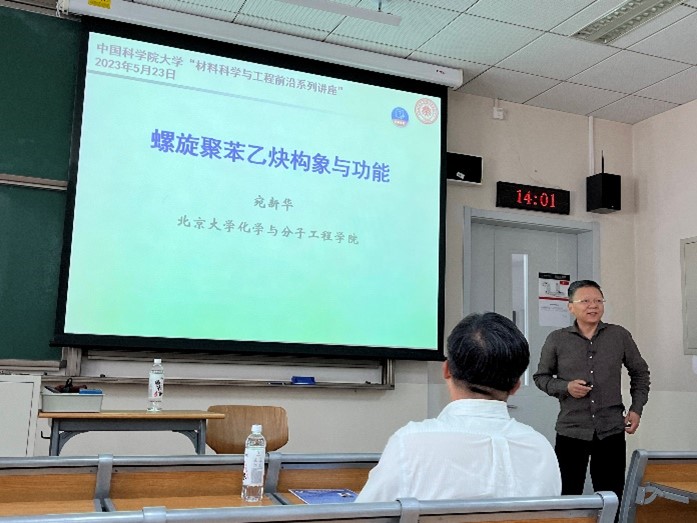 Lecture by Prof. Wan Xinhua on Conformation and Function of spiral polyphenylene
Lecture by Prof. Wan Xinhua on Conformation and Function of spiral polyphenyleneAt 14:00 on May 23, 2023, Professor Wan Xinhua from Peking University was invited by Professor Huang Hui to give a lecture on "Conformation and Function of spiral polyphenylene" in the University of Chinese Academy of Sciences. The lecture was held in Room 114 on the first floor of the Teaching Hall.
The introduction of chirality provides more controllable variables for the structural design of polymers. Helical structure is an important chiral structure. Optically active helical polymer has a wide range of practical and potential applications in chiral recognition, enantioselective separation asymmetric catalysis, circular polarization fluorescence, information storage and multi-channel sensing, and is becoming an important research direction in the field of functional materials.
In the lecture, Professor Wan Xinhua first introduced the use of strong hydrogen bonds between molecular lactam bonds to obtain the main chain luminous monosubstituted polyacetylene, and studied the influence of various internal and external factors on the fluorescence properties. The reversible switching of fluorescence and CPL is realized by using the solvent and temperature responsiveness of hydrogen bond, making it applicable in CPL detector. A newly developed self-display active ester-amine reaction is introduced, which can be used to quantitatively monitor the reaction process in real time with visible fluorescence changes. It can be used to identify various chiral organic amines with different structures. It shows enantioselectivity to various chiral amines, and can provide multi-channel visual quantitative detection. Then Professor Wan explained to the students a new class of amphiphilic polyphenylacetylene homopolymer, which can self-assemble into regular hexagonal nanosheets in solution, and show the chiral transfer process on a two-dimensional scale. The growth process shows the characteristics of "first nucleation and then growth", and the rigid helical polymer molecules inside are arranged in hexagonal columns. Based on the difference of the conformation of polystyrene fast helical, the "self-resolution" driven by helical conformation was realized. The circularly polarized fluorescence intensity of polyphenylene was significantly enhanced under the hexagonal lattice confinement. In the end, Professor Wan Xinhua had a discussion with the teachers and students on site and received warm responses from them.

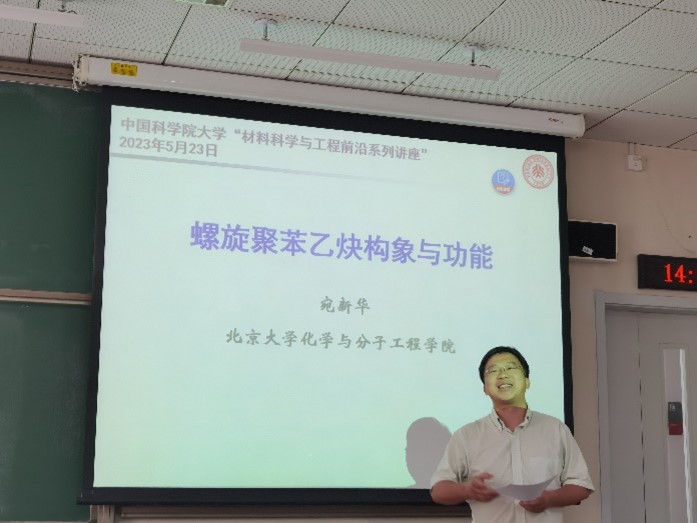
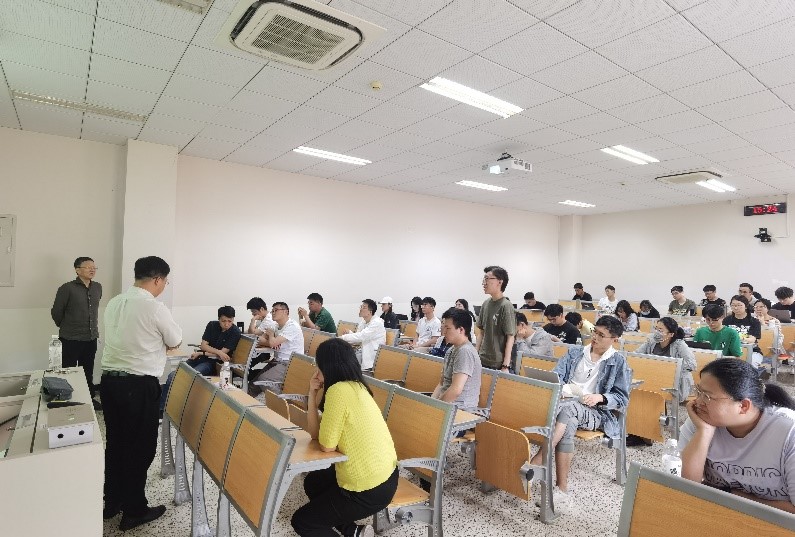
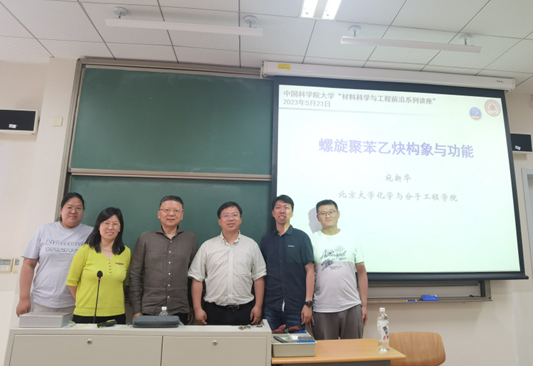
Wang Xinhua, Professor, Doctoral Supervisor, Director of the Key Laboratory of Polymer Chemistry and Physics, Ministry of Education, Peking University. In 1997, it was awarded the third prize of National Natural Science (ranking 2), in 1998, it was awarded the special government allowance of The State Council, in 2003, it was supported by the National Outstanding Youth Foundation, and in 2004, it was selected as the first batch of national candidates for the New Century Hundred Million Talents Project. In 2010, he was appointed as the Special Professor of Changjiang Scholars of the Ministry of Education. In 2018, he won the second prize of Natural Science of the Ministry of Education. Research interests and fields: polymer synthesis and advanced functional materials. He has published more than 200 SCI indexed papers and written chapters of 6 English books.
-
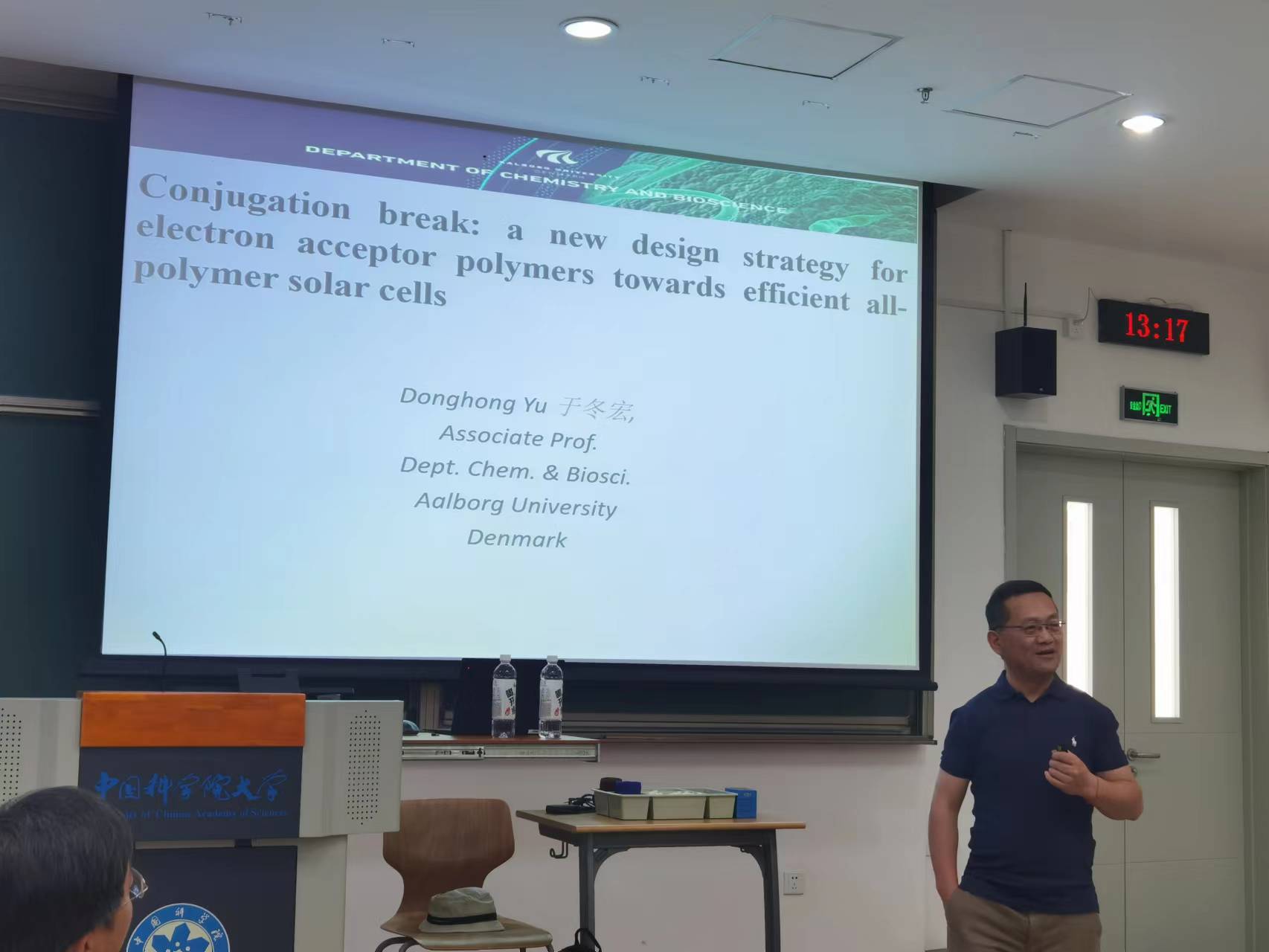 Conjugated break: A new design strategy for electron acceptor-polymers in all-polymer solar cells
Conjugated break: A new design strategy for electron acceptor-polymers in all-polymer solar cellsAt 13:00 on May 18, 2023, Prof. Donghong Yu from Aalborg University of Denmark was invited by Prof. Hui Huang to deliver the keynote lecture "Conjugate break: A New Design Strategy for electron acceptor-Polymers in all-polymer Solar Cells" in the University of Chinese Academy of Sciences. The lecture was held in Room 106 on the second floor of the classroom.

Since the beginning of life on Earth. They live mainly on thermal radiation from the sun. Solar energy is an inexhaustible treasure house of energy endowed by nature. Organic solar cells (OSCs) have many advantages, such as low cost, light weight, ultra-thin, flexibility, and easy preparation of large areas. They are broad application prospects in portable, flexible cells, photovoltaic building energy supply and other fields.
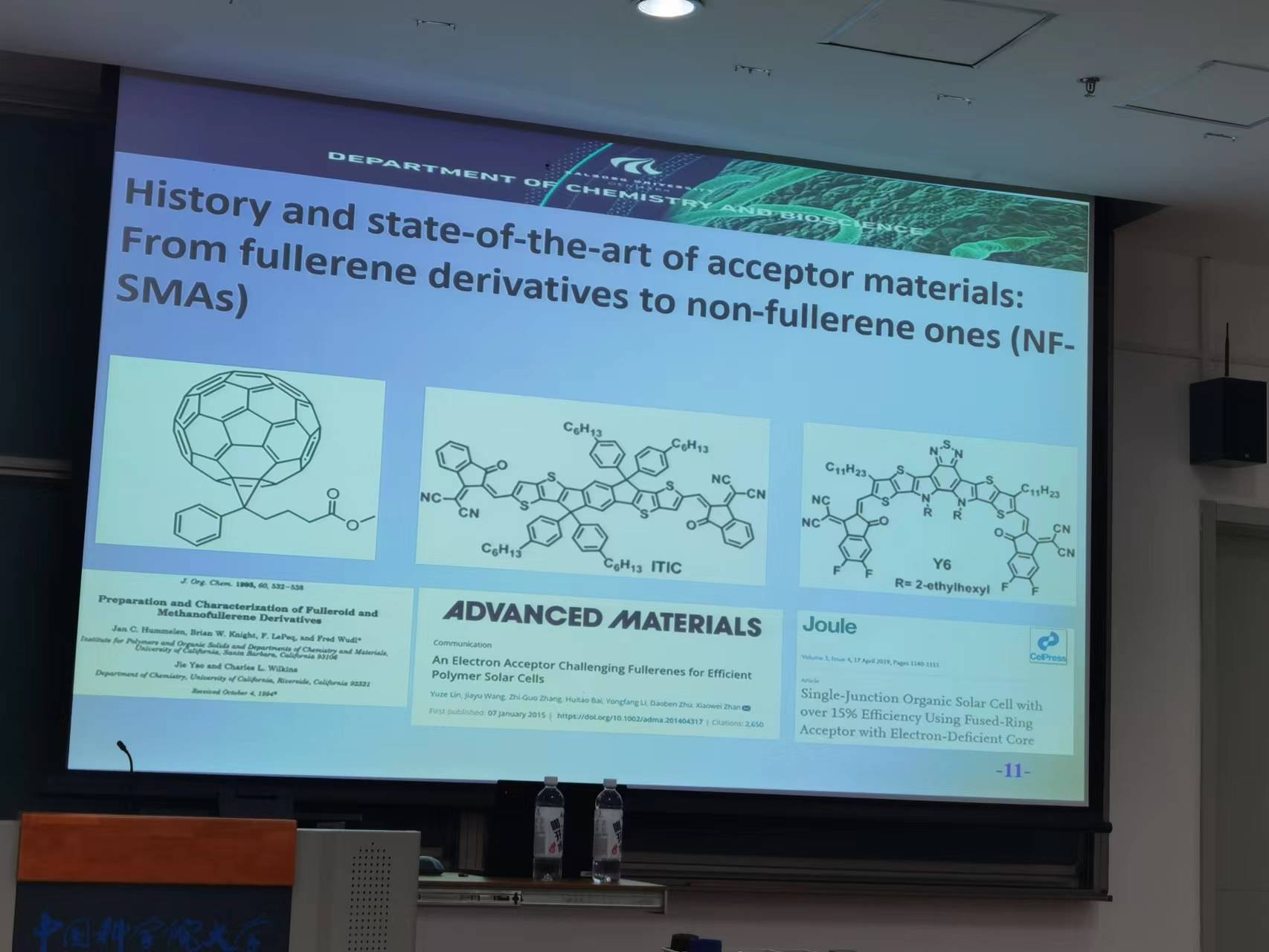
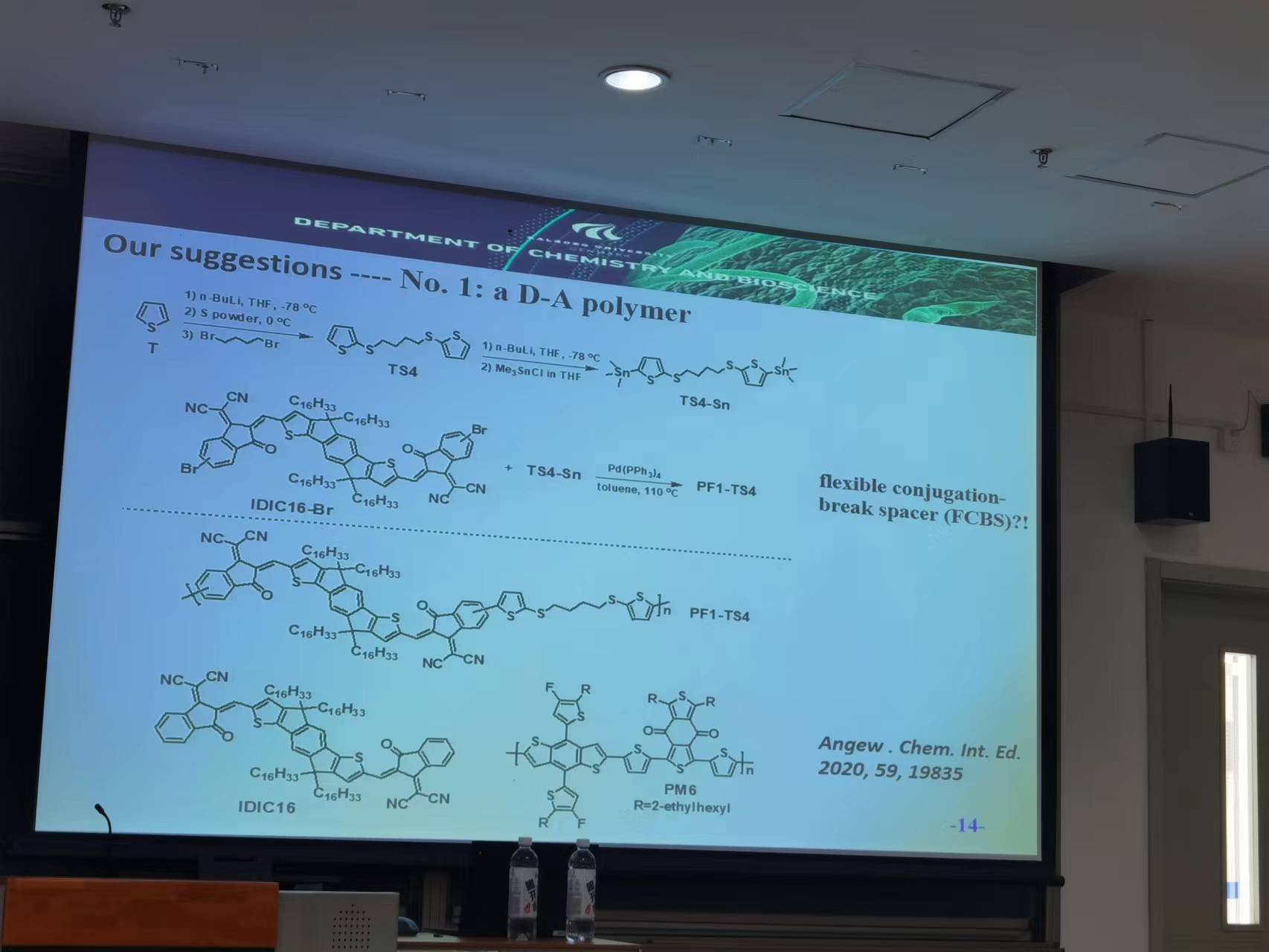
Starting with the history of organic solar cells (he started with fullerenes, went to ITIC, and finally to the current star molecule Y6), Prof. Donghong Yu lays out the challenges of solar cells. The main difficulty of the industrialization of organic solar cells lies in their poor stability, which leads to the energy generated is not enough to offset the energy consumed in the preparation of organic solar cells.The main chain of the fully conjugated organic polymer solar cell is linked to aromatic hydrocarbons (heteroaromatic hydrocarbons), which makes the degradation and recovery of organic solar cells difficult. To solve this problem, Prof. Donghong Yu proposed to introduce alkyl sulfur into the main chain of organic solar cells. The introduction of heteroatoms provides a potential possibility for the degradation of solar cells. Based on this, Yu Donghong's team prepared a series of non-fully conjugated organic polymer solar cells with sulfur atoms in the main chain. Then, Prof. Donghong Yu introduced some techniques of writing the article, hoping to be helpful to teachers and students on site. Finally, Prof. Donghong Yu communicated and discussed with the teachers and students on site, which was warmly responded by the teachers and students on site.
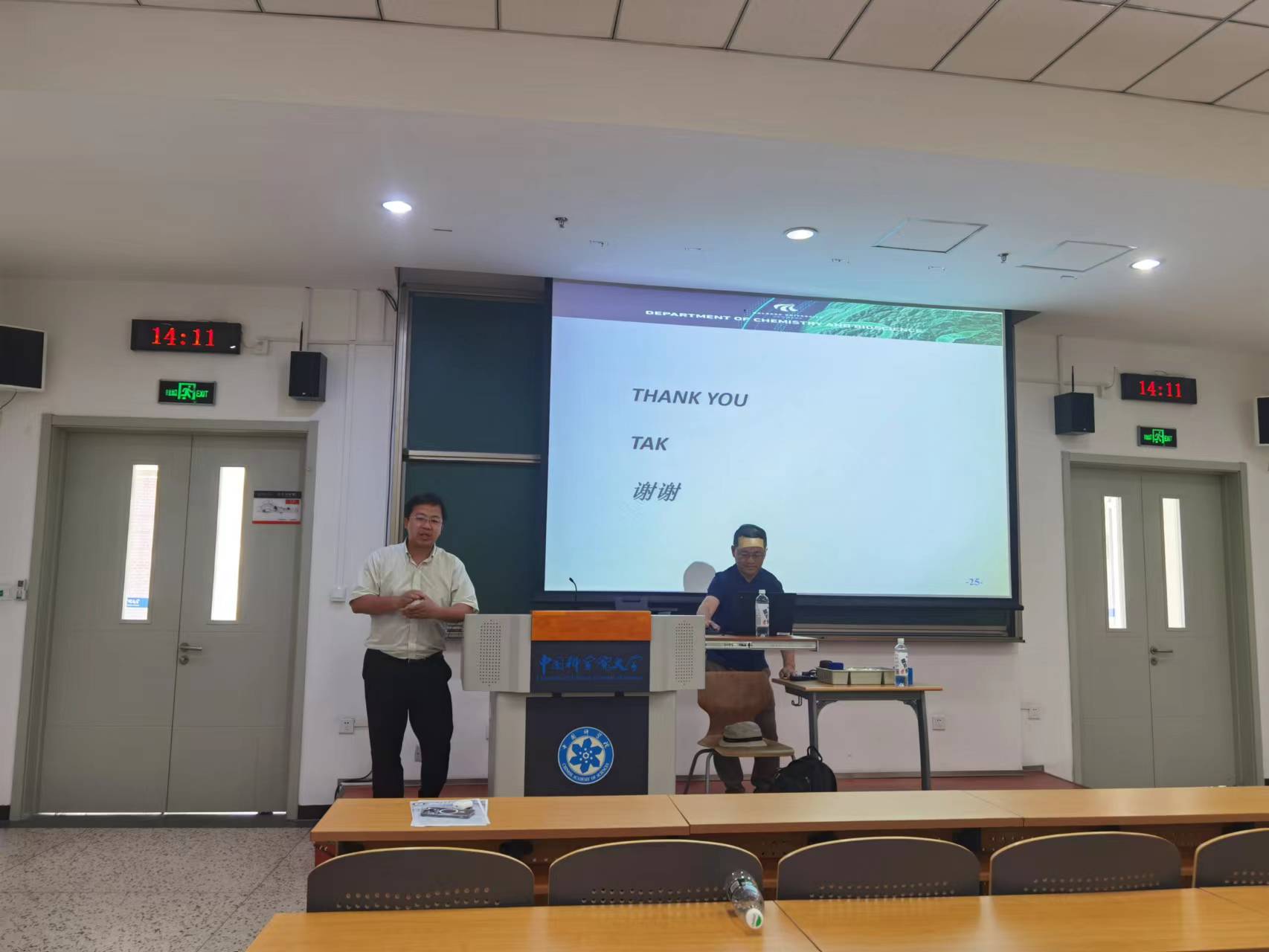
Dr. Donghong Yu obtained his B.Sc(1991)/M.Sc.(1994) in polymer chemistry and physics in Jilin University, China. In 1997 he was awarded the PhD degree in polymer chemistry and physics Changchun Institute of Applied Chemistry, Chinese Academy of Science, China. Then he started working as postdoc in National Institute of Materials and Chemical Research, Japan & Department of Materials and Production, Aalborg University, Denmark, in 1998 and 2000, respectively. Later in 2001 and 2006, he was appointed as a faculty member as tenure-track assistant professor and tenured associate professor in Department of Chemistry and Bioscience at Aalborg University, respectively.
-
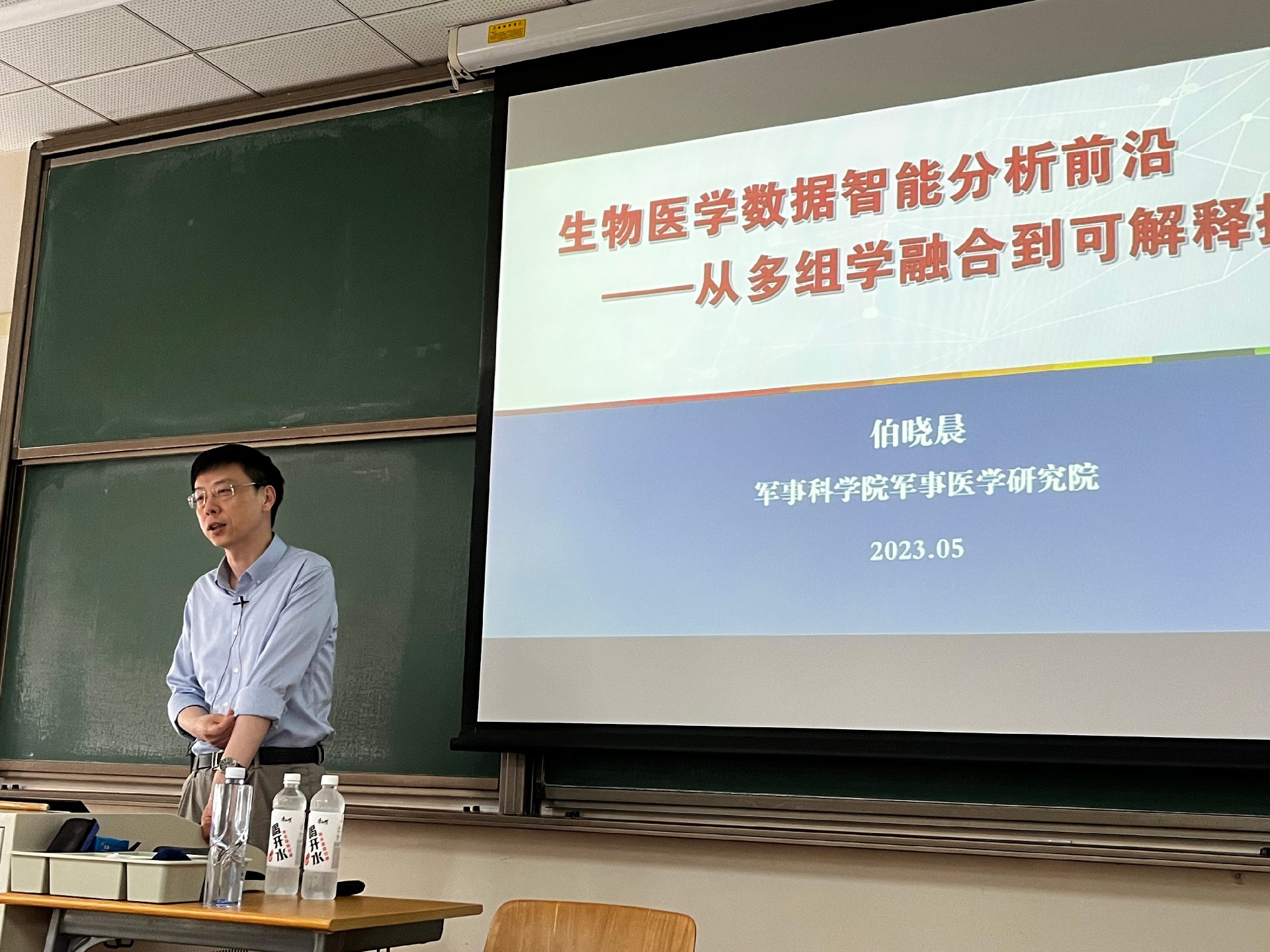 Professor Bo Xiaochen: Lecture on "Frontiers of Biomedical Data Intelligent Analysis - From Multi-Omics Fusion to Interpretable Mining"
Professor Bo Xiaochen: Lecture on "Frontiers of Biomedical Data Intelligent Analysis - From Multi-Omics Fusion to Interpretable Mining"At 14:00 on May 17, 2023, Professor Bo Xiaochen from the Military Medical Research Institute of the Academy of Military Sciences was invited by Professor Huang Hui to come to the University of Chinese Academy of Sciences to carry out "Frontiers of Intelligent Analysis of Biomedical Data-From Multi-omics Integration to Interpretable Mining" Thematic lectures are held in Jiaoyi 114.
Multi-omics data fusion analysis is an important support for current basic and translational research in life sciences. It faces challenges such as wide data space and strong heterogeneity. The report covers four aspects: multi-component fusion analysis technology and application, multi-component fusion to multi-attribute fusion, data mining based on interpretable AI, cross-scale integration and digital twin

The report system sorts out the algorithmic ideas and technical approaches of the current fusion analysis of multi-omics data, and extends it to the fusion of multi-attributes. In addition, the particularity of biomedicine requires its intelligent system to have strong explainability. The report summarizes the ways to realize the interpretable analysis of artificial intelligence data analysis, and gives examples. Finally, the report also briefly introduces the frontiers of intelligent analysis of biomedical data in the future—cross-scale integration and digital twinning.
Bo Xiaochen is a military medical researcher and doctoral supervisor of the Academy of Military Sciences, a member of the Science and Technology Committee of the Academy, a deputy director of the Intelligent Health and Bioinformatics Committee of the Chinese Society of Automation, and a standing member of the Network Pharmacology Committee of the Chinese Pharmacological Society. The current research direction is biomedical big data processing and analysis, biomedical artificial intelligence technology. As the person in charge and the main researcher, he successively undertook projects such as national key research and development projects, national major new drug creation, 863, and major research projects of the National Natural Science Foundation of China, and published first and corresponding author papers in journals such as Nature, Nature Machine Intelligence, Nature Microbiology, and Molecular Cel1. 100 Yu Pian has been selected into the "Young and Middle-aged Science and Technology Leading Talents" of the Ministry of Science and Technology, the "Ten Thousand Talents Program" science and technology leading talents of the Organization Department of the Central Committee of the Communist Party of China, and the top talents of military disciplines. support.
